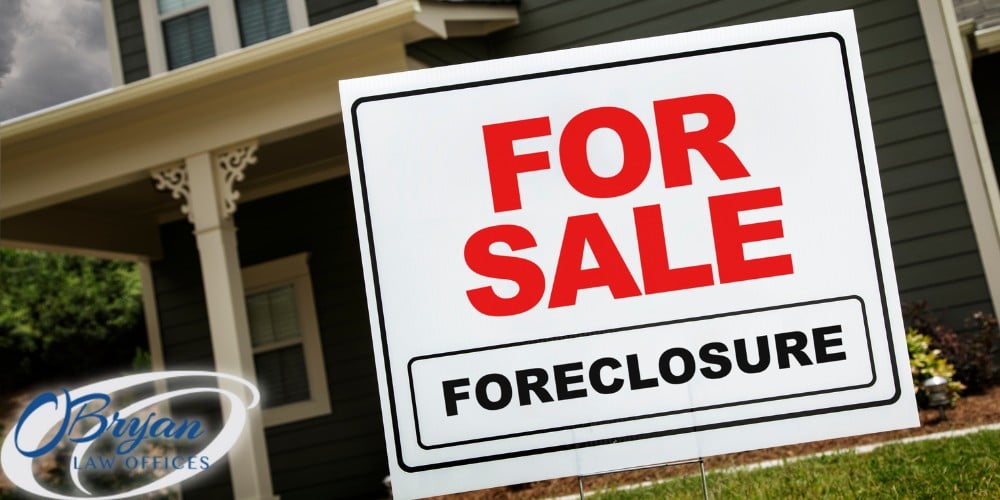Most people are aware of what happens if they fall behind on their mortgage payments. Pre-foreclosure occurs when the borrower defaults on their loan. Their mortgage lender will act to collect the debt they are owed. Eventually, they may even seek to begin the foreclosure process against the borrower. However, did you know that there are a few valid options for consumers to avoid foreclosure? One of these options is called a deed in lieu of foreclosure. This blog outlines what a deed in lieu of foreclosure is, as well as how you can use one to your advantage if necessary.
At O’Bryan Law Offices, we make it our goal to educate consumers on their rights and financial options. Our Kentucky bankruptcy lawyers are highly skilled and knowledgeable in more than just bankruptcy, although we also advocate for the use of bankruptcy as a debt relief tool. Many people understand bankruptcy as the worst financial decision you could ever make, but that is far from the truth. Bankruptcy is a completely legal way for debtors to regain control of their finances and become debt free. If you’re looking to take advantage of the benefits of bankruptcy, contact our office for your free consultation. Call our Louisville office at 502-339-0222 or fill out our online intake form.
What Is a Deed in Lieu of Foreclosure?
A deed in lieu of foreclosure is an agreement with your mortgage lender in which you give them the deed to your home in order to avoid foreclosure on your home. There are a few reasons why one might want to pursue this option. First, foreclosures will show up on your credit report, and they’ll often tank your credit score. They can also make it exceedingly difficult for you to buy a home for the next several years.
Avoiding the foreclosure process with a deed in lieu agreement is one way in which you can be released from your outstanding mortgage debt without having a foreclosure on your credit report. If the lender agrees to accept a deed in lieu of foreclosure, this releases the lien on the home. This way, the lender gets to recoup on their losses without forcing a foreclosure on you.
A deed in lieu agreement also releases you from the remainder of your mortgage payments. This is a popular option for those who are struggling with underwater mortgages. An underwater mortgage is one where someone owes more on their home than what it is worth.
Foreclosure vs Deed in Lieu of Foreclosure

Foreclosures and deeds in lieu of foreclosure agreements are not the same thing. Deeds in lieu have a few advantages over foreclosures, such as the ability to avoid having a foreclosure on their credit report. In a foreclosure, the mortgage company or lender can reclaim the property after a certain period of nonpayment by the borrower. If the home sells for less than its value, they can also sue the borrower for the remainder of what they are owed.
A deed in lieu of foreclosure allows the borrower to avoid a lawsuit and settle their debt more quietly. Their credit may also suffer less of a blow than it would from a foreclosure proceeding. Lastly, they may be able to try purchasing a home sooner than they could after a foreclosure.
Short Sale vs Deed in Lieu of Foreclosure

A short sale is similar to a deed in lieu of foreclosure, but they are not the same. In both cases, the borrower will give up their ownership of the property. The lender also releases them from their obligations and mortgage payments in both cases. However, short sales involve the actual sale of the home. With a deed in lieu agreement, the borrower willfully gives the deed back to the lender, who can sell the property to recoup their losses.
In a short sale, the borrower must prove financial hardship, showing that they cannot make payments on their mortgage loan. The borrower can sell the home for less than what they owe on it, which is where the term “short sale” comes from. Every bit of the proceeds from this sale will go to the lender, who can then choose between two options. One option is when the lender forgives the remaining mortgage debt. The other option is when the lender pursues a deficiency judgment against the borrower, asking that they pay either part of the difference or the full difference.
When to Consider a Deed in Lieu Instead of Foreclosure
When someone falls behind on their mortgage debt payments, they may think that foreclosure is their only option. However, a deed in lieu of foreclosure is a very valid option for those who want to avoid the negative consequences of foreclosure. It can be less damaging to your finances and your credit score than foreclosure. Deed in lieu agreements are often preferred over foreclosure for these reasons.
Ultimately, we recommend working with an experienced attorney in order to determine which process is best for you. Some homeowners prefer to try other options, such as loan modifications or a short sale, before willingly giving the deed to the lender. We can help you examine all options available to you and choose the best for your situation.
How Does a Deed in Lieu of Foreclosure Work?

Before making any decisions, it is important to fully understand how a deed in lieu agreement works, as well as what the pros and cons are. During the process, the borrower decides to give the deed of the home back to the lender. In exchange, the lender releases the borrower from all obligations under the mortgage agreement. A document will be signed by both the borrower and the mortgage servicer, then notarized and kept in public records.
In the following sections, we outline the advantages and disadvantages associated with a deed in lieu of foreclosure.
Advantages of Deed in Lieu of Foreclosure
Both sides have certain advantages in deed in lieu agreements. For example, both sides get to avoid the long, expensive, and time consuming process of foreclosure. The borrower also gets to handle the situation quietly and avoid embarrassment. Both sides must also come to a mutual agreement about the situation, which is obviously more amicable than foreclosure and eviction.
In some cases, borrowers may even be able to come to an agreement with the lender that allows them to remain in the home. The process is generally preferred by lenders, as it allows them to avoid the costly foreclosure process. In other words, deed in lieu of foreclosure agreements have several advantages that make them a very attractive option for both sides.
Disadvantages of Deed in Lieu of Foreclosure
As with most financial decisions, the option for a deed in lieu agreement does have a few disadvantages. The biggest disadvantage is the drop in credit score that one may see. A significant dip in your score could greatly hinder your ability to secure a mortgage in the future. Additionally, your home could still be underwater after a deed in lieu agreement.
What Can Prevent You From Receiving a Deed in Lieu of Foreclosure?

A few circumstances could prevent you from being able to negotiate a deed in lieu of foreclosure. If you have judgments against you, tax liens, or encumbrances, they could prevent the deed in lieu process. Let’s say that you have liens against the home by the time you offer the deed in lieu of foreclosure to the lender. If the lender agrees to this, they would have to take on the responsibility of those liens. Lenders are unlikely to agree to this arrangement.
Does a Lender Have to Accept a Deed in Lieu?
No. Lenders are not obligated to accept a deed in lieu of foreclosure. If the agreement benefits both sides, they are likely to agree. However, if accepting a deed in lieu of foreclosure would hurt them financially or be more trouble than it’s worth, they will likely reject the offer. It is important to note, however, that many lenders prefer the deed in lieu option over foreclosure, as foreclosure is often much more costly and time-consuming.
Why Would a Lender Accept or Reject a Deed in Lieu of Foreclosure?
Lenders have the authority to accept or reject a deed in lieu of foreclosure, depending on how the agreement will affect them personally. They take many factors into consideration, and it’s important to understand this before you pursue a deed in lieu of foreclosure as an option. Below, we list some of the reasons why a lender might reject a deed in lieu agreement.
- Tax liens or judgments on the property: As we mentioned before, having liens or judgments on the property could also deter a lender from accepting a deed. The reason for this is because they would be responsible for those obligations if they agree to accept the deed.
- Depreciation of the home’s value: If you’re underwater on your mortgage, this means you owe more money on your home than it is worth. This could have happened because of a depreciation in the property’s fair market value. Lenders may only agree to a deed in lieu in this situation if you agree to pay the difference.
- Poor condition of the home: If the home hasn’t been properly cared for and is in disrepair or a poor condition, lenders may reject the deed no matter what.
Lenders do have a few incentives for accepting deeds in lieu. We list these below.
- Good condition of the property: If you’ve taken good care of the home, it may sell quickly, which incentivizes lenders to accept a deed in lieu of foreclosure.
- Faster and cheaper process: Accepting a deed in lieu of foreclosure is a faster and cheaper alternative to foreclosure itself. Lenders would have to pay legal fees, go to court, prove that you’re behind on payments, and go through the eviction process if they choose foreclosure. Deed in lieu agreements allow them to save both time and money.
How Does a Deed in Lieu of Foreclosure Affect Your Credit Score?
Foreclosure processes will remain on your credit report for up to 7 years. Deed in lieu agreements, however, will fall off after only 4 years. While both options will drop your credit score, deeds in lieu often involve a less significant drop. Therefore, if you’re concerned about your credit score, you may want to consider a deed in lieu of foreclosure. This is especially true if you intend to buy a home or obtain a mortgage in the future.
Is a Deed in Lieu of Foreclosure Right for You?

Deciding whether or not to pursue a deed in lieu agreement heavily depends on your individual situation. You’ll need to weigh the benefits and drawbacks of this decision, as well as others, such as foreclosure, short sale, and even bankruptcy. Many people in these tough situations find themselves wondering, “If my house is foreclosed do I still owe the bank?” Our attorneys understand that being in bad financial standing can very easily strain your emotions and mentality. That’s why we advocate for bankruptcy as a legitimate alternative to foreclosure and other stressful situations.
The foreclosure defense lawyers at O’Bryan Law Offices are here to reassure you that the legal process of bankruptcy can help you regain control of your finances. If you’re struggling, bankruptcy allows you to hit the reset button. It is a legal process with legal protections that other options often can’t provide for you. So, rather than working with shady credit repair companies or trying loan modification, consider bankruptcy as your way out.
Contact O’Bryan Law Offices Today
The experienced attorneys at O’Bryan Law Offices have extensive experience counseling Kentucky and Southern Indiana residents on how to get out of financial slumps. Hardships can come out of nowhere, even for the most responsible of consumers. That’s why we’re here to help. Bankruptcy may sound scary, but it often makes the most sense for consumers. If you’re struggling with your financial situation, bankruptcy can give you the breathing room you need to get back on your feet. To schedule a free consultation with us, please call our office at 502-339-0222 today.


